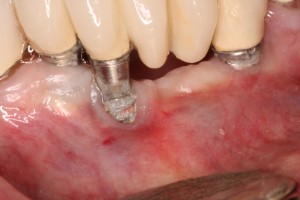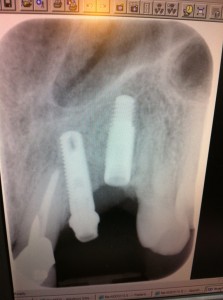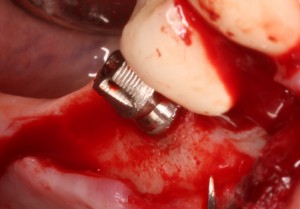1. Dental implants can fail (peri-implantitis).
There is no doubt that dental implants are a amazing option for patients to replace missing teeth. Numerous studies have reported a 10 year survival rate of 96.5%. However, a increasing amount of reports have been describing implant complications. These complications include implant loss due to bone loss around the dental implant or peri-implantitis. The good news is that research has shown that only 3.3% of dental implants are lost over a 10 year period in healthy patients. The bad news is that 43% of dental implants show some sort of bone loss (peri-implantitis). Patients with a history of chronic periodontitis have a higher 10 year failure rate (8%) than healthy patients (3.3%). This is also true with patients that smoke and/or do not adhere to a strict cleaning schedule. Therefore, patients should be aware that factors that include smoking, poor oral hygiene, and a history of periodontitis will lower the 10 year survival rate of dental implants. “Reasons why you loss your tooth or teeth, is the same reason why you may loss a dental implant.” Ryan Lanman DDS MSD
2. Not all dental implants are created equally.
There are many types of dental implants in the marketplace today, and they are not all the same. There are only a hand full of (what I consider) major dental implant manufactures with 30 plus years of experience. These companies include Straumann, Nobel, Zimmer, Biohorizons, and AstraTech. They spend a large amount of time and money on product research focusing on design, titanium composition, sterility, and surface treatment. All this research is to provide the highest quality dental implant to the patient. Generic or discounted implant companies provide little to no research evidence about their product. Their strategy is to gain market share by cutting initial cost by a third. This approach may lead to increase dental implant complications, such as fractures, infections, and bone loss. Therefore, patients need to ask what type of dental implant is being placed into their body. Also, patients need to be cautious of advertising ploys. “Dental Implant Special, We Guarantee Success!” Unfortunately, sometimes you get what you pay for.
If you are interested in how dental implants can change your life,
Check out our Dental Implants Page.
3. There is no such thing as a dental implant specialist or implantologist.
The American Dental Association does not recognize dental implants as a separate dental speciality, unlike Periodontics, Endodontics, Pedodontics, Oral Pathology, Orthodontics, and Oral Maxillofacial Surgery. Therefore, terms like “Dental Implant Specialist” or “Implantologist” are made up terms that some practitioners use to market themselves as a specialist. The truth is that only Periodontists and Oral Surgeons complete residency for 3 to 4 years on proper surgical techniques regarding dental implants. This formal training is completed either in a hospital and academic university setting. Non dental specialist who surgically place implants, usually complete a weekend training course or have no training at all. Patients should ask their practitioner about his or her prior training, success rate, and quantity of dental implants being placed per year.
4. Dental implant placement is a surgical procedure.
Dental implant placement is a successful treatment option, but should never be considered non-surgical or easy. The reality is that placing a titanium screw in bone were blood vessels, sinus cavities, and nerves are located should always be treated as a complex surgical procedure. Dental implants placed improperly with regards to a patients anatomy can and will lead to infections, hemorrhage, nerve injury (loss of feeling), and trauma to adjacent teeth. Patients should be informed of these possible risks and should ask if they are at increase risk due to bone morphology or bleeding disorder (inherent or drug induced).
5. Marketing statements like “Teeth in a hour” or “No Pain, No Bleeding, No Sutures” only applies to specific scenarios.
These statements are possible, but only in certain scenarios. As a board certified periodontist, it is my responsibility to evaluate every case for the possibility of a conservative approach to dental implant placement. Factors, such as bone height and width and amount of keratinized gingiva are important when deciding if a conservative approach should be taken. Disregard of these parameters will lead to poor results. Also, this can lead to a decrease in the long term prognosis of the implant and/or cause irreversible damage to the patient. Patients should be aware that if a deal sounds to good to be true, than it probably is.
If you are interested in investing in dental implants, you need to ask questions. Dental specialist and general dentist are not all selling the same product or treatment. Therefore, you should not treat your health and body like you are buying a piece of furniture or car. Discounted treatment, usually always leads to discounted results.





 by
by 



